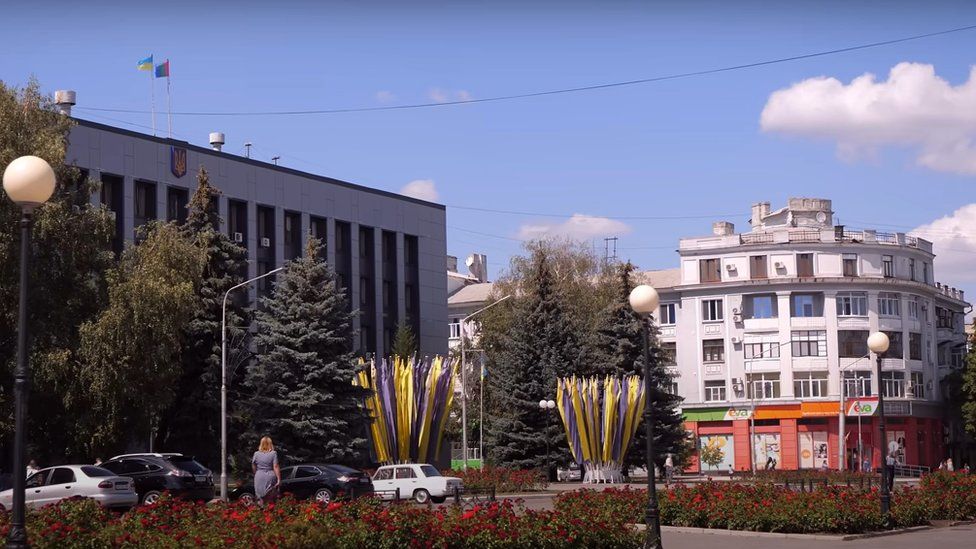ARTICLE AD BOX
 Image source, It's A Good Trip / YouTube
Image source, It's A Good Trip / YouTube
Residents of Bakhmut describe the city before the war as cosy and comfortable to live in
By Vitaly Shevchenko
BBC Monitoring
The eastern Ukrainian town of Bakhmut is now known across the world as the site of the longest and possibly bloodiest battle in Russia's war on Ukraine.
It is now almost completely destroyed, and almost all of its ruins are controlled by Russian forces.
Nearly every single resident has now left, and those the BBC has been able to contact describe Bakhmut before the war as extremely well looked-after, cosy and leafy.
They also speak fondly of the two things which had made the town famous: sparkling wine and salt.
Wine
The city was known far beyond Ukraine's borders for its sparkling wine. The local winery, set up in a huge abandoned gypsum mine in the 1950s, was among the biggest and best producers of the fizzy drink in the USSR and then in independent Ukraine. Its location, about 70 metres below ground, made it easier to achieve the right temperature for the drink to ferment.
It is now owned by a company called ArtWinery, and its marketing director Oleksandra Cherednychenko told the BBC about the first time she visited the vast caves.
"It was an amazing feeling. It is an underground city so vast that they used proper vehicles to get about within it - lorries to transport goods, and people used buggies. There were endless rows of bottles, and you couldn't see where they ended.
Image source, Oleksandra Cherednychenko
Image caption,Oleksandra Cherednychenko - seen here in the cellars before their destruction - remembers them fondly
"It was very nice inside, with classical music playing, and walls painted yellow, green and red. It was mesmerising. Nothing beats wine-testing underground.
"It is one of the main symbols of Bakhmut, and it had a soul. Company workers planted a vineyard right next to the main office, and there was a nice garden with peacocks," Oleksandra said.
For decades, sparkling wine from Bakhmut was highly sought after in the Soviet Union, and it was popular during celebrations such as weddings or New Year's Eve.
The winery's operations were suspended the day Russia invaded Ukraine on 24 February 2022, and most of its employees were evacuated out of Bakhmut.
In May 2023, Yevgeny Prigozhin, the head of the Wagner mercenary group, said all of the winery's buildings had been destroyed. Wagner has been at the forefront of Russian forces fighting Ukrainian troops in Bakhmut.
Salt
Image source, United 24
Image caption,Salt from mines near Bakhmut was exported far beyond Ukraine
Salt is another product which has made Bakhmut well-known in Ukraine and beyond. Before the war, the salt-mining company Artemsil produced more than 7 million tonnes of salt a year, exporting it to 22 countries from Armenia to Denmark.
"It was a prestigious company to work for. When I got a job there, people were surprised I got hired without powerful friends in high places," said Anzhelika, who spent almost 20 years working for Artemsil. "It was the best time of my life, we felt secure."
Anzhelika told the story of two former colleagues who worked in a lab next door to her office. "One was killed when a missile hit her house in January. It happened on her birthday, actually. The other one has started drinking herself to death. It could be the feeling of helplessness, or the stress of it all," she said.
Anzhelika remembers Bakhmut as a beautiful, well looked-after city.
"Our government had decided to make a showcase out of such frontline cities - to show those who left Ukraine what they were missing. A lot of money was spent on Bakhmut over the past years," she said.
Music college
Natalya Putrya, a piano teacher at Bakhmut's Culture and Arts College, has similar memories of the city.
"It was stunningly beautiful. The local authorities took good care of roads and pavements - this may not be such a big deal for Europe, but for us it was unusual. They had built a marvellous stadium and refurbished our college, lavishly. New, very good musical instruments were bought," she said.
Her college hosted piano competitions for all of Ukraine and held frequent public concerts to mark occasions such as St Valentine's Day or New Year's Eve. "There is no life without culture and art. Bakhmut was always interested in culture," Natalya said.
Image source, Facebook/Natalya Putrya
Image caption,Natalya Putrya (seated) taught piano at Bakhmut's Culture and Arts College before Russia's full-scale invasion
One of her students, Oleksandra, has fond memories of the college in Bakhmut.
"We went there at dawn and went home at sunset. The night guard would tell us to get out of college at nine in the evening, and I remember that on the way home everything felt just right. It was the right time and place to be. It was our home."
Oleksandra has vivid memories of the night before Russia's full-scale invasion last year.
"On 23 February we held a massive concert, and I remember the beautiful sunset that evening. I was walking home, looking at the sky and the stars. And I wondered: 'How long will the sky above stay peaceful?' The stars were absolutely amazing that night. The next morning, we were woken up by people shouting that war had started and our cities were being bombed."
Image source, Ukrainian Armed Forces
Image caption,Bakhmut is now largely destroyed after many months of shelling
Oleksandra told me how devastated she was to see her college being damaged by fighting.
"I had tears in my eyes when I saw photos of our concert hall after it had been hit - right where our beloved grand piano was. It was every pianist's dream to take to that stage and play it. When we learnt that all the windows got smashed we knew that was the end of our pianos. All the strings will go rusty because of the damp," she says.
Life away from home
After the start of the war, the college moved to Kamyanets-Podilsky, a city in western Ukraine.
"This changed the dynamic of our relationship with teachers completely," says Oleksandra. "We are one big family now, because we've all lost our homes. We've been through all this together. The support we're getting from each other is priceless."
Her teacher Natalya agrees: "Yes, we're family. We meet after work and we stay in touch, we go out all the time - for a cup of coffee or just for a chat in a cafe. This must be the warmth we've brought from Bakhmut. We're trying hard to preserve it, because it's tough living without a home."
But despite the tragedy of Bakhmut's destruction, Natalya has one dream: to return to her native eastern Ukraine, even if it won't be Bakhmut.
Image source, Bakhmut Culture and Arts College
Image caption,Students from the college dream of returning home one day

 1 year ago
13
1 year ago
13








 English (US)
English (US)